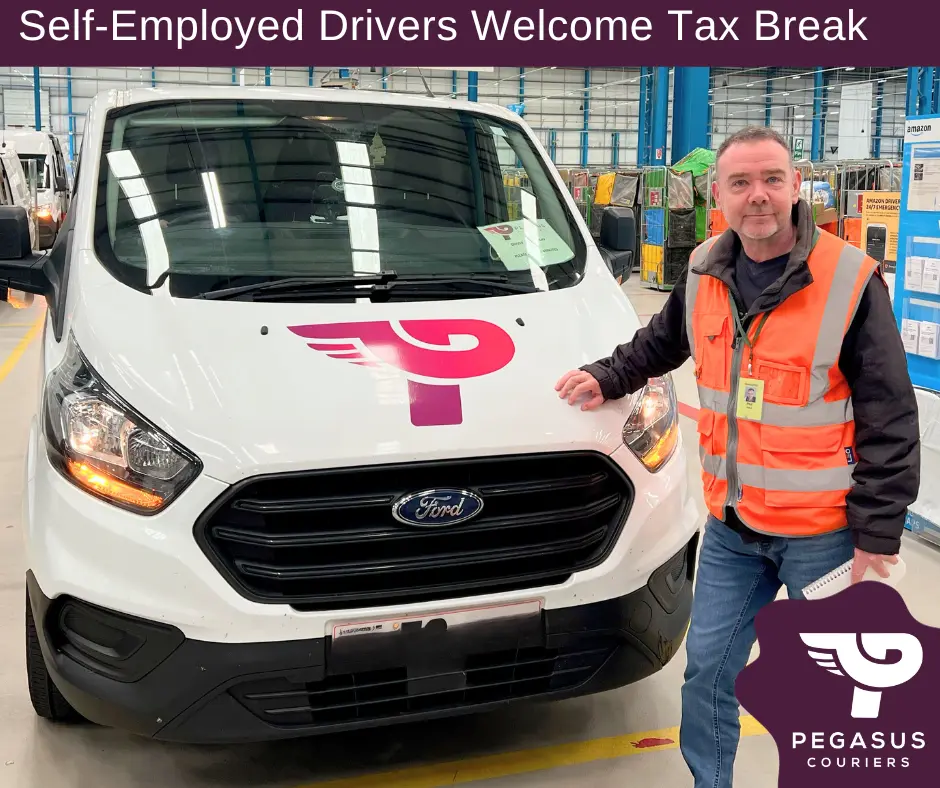UK Courier Service: Strategies to be the best Parcel Delivery Service Expert Courier Tips for Efficient Parcel Delivery Mastering UK courier...
More HereSelf-Employed Courier Drivers Benefit From Tax Cuts

In a move that’s sure to bring a smile to the faces of self-employed courier drivers across the UK, the latest tax cuts could see them pocketing an additional £350 a year.
This delightful boost in earnings is a direct result of the new measures announced in the recent Autumn Statement, a beacon of good news for the country’s 4 million independent workers.
This is a timely silver lining given the troubling driver shortage that has been casting a shadow over the logistics sector. The struggle to find enough drivers has put a strain on the industry, but this tax relief could be seen as encouragement for more to join the growing sector.
Chancellor Jeremy Hunt, in his address, stated they were committed to nurturing the backbone of the marketplace—small business owners. For those behind the wheel of the courier industry, this gesture of support couldn’t come at a better time and is being warmly embraced by all who will benefit from this much-needed financial reprieve.
“The measures outlined in the Autumn Statement provide much-needed financial relief; however, we are still needing more incentives for individuals to join the self-employment sector. This will help address the driver shortage issue but also fuel the growth of the industry as a whole,” said industry leader and Pegasus Couriers director Phillip West.
Self-employment offers attractive benefits, particularly for those who value flexible work and independence. However, there is often confusion about what self-employment actually means for individuals in our industry. “Our recruitment team has noticed that many are drawn to self-employment, especially for seasonal work, as a means to navigate between industries. While some have returned to their pre-pandemic jobs and others prefer the courier industry, we still face significant shortages,” West added.
The Autumn Statement highlighted that a self-employed person earning around £28,000 per year could save an average of about £350, equivalent to around £30 per month.
UK Tax specialist firm With Wise spokesperson Darryl Oung welcomed the news but emphasised that more needed to be done to benefit the
self-employed, especially in the long term.
Wise specialises in the self-employment sector, particularly within logistics and the courier industry. Their platform is used by over 250 logistics firms and more than 14,000 self-employed drivers.
“The Class 2 cut and Class 4 reduction in national insurance will undoubtedly put more money in the pockets of the self-employed. However, we must continue to push for additional measures to address the driver demand issues and attract more individuals, including drivers, to explore the world of self-employment,” Oung added.
The Association of Independent Professionals and the Self-Employed (IPSE) welcomed the tax cuts but cautioned that more action is required. Similarly, the Federation of Small Businesses (FSB) Policy Chair, Tina McKenzie, expressed satisfaction with the changes as they align with their long-standing campaign efforts.

By: With Wise
Key changes and general information for self-employed individuals:
- Class 2 national insurance will be scrapped from April 2024, saving the average self-employed person 192 a year.
- Class 4 national insurance will be reduced from 9% to 8% on profits between 12,570 and 50,270.
- These changes will result in an average total saving of around 350 for someone earning 28,000 a year.
- The government aims to reform and simplify the taxes paid by the self-employed.
- The government aims to reform and simplify the taxes paid by the self-employed and employees.
- The changes for self-employed individuals and employees will come into effect at different times (April and 6 January, respectively).
FOLLOW US TO KEEP UP TO DATE:
Driver Theory Test Cheats Impact All Road Users
Will Learner Driver Test Cheating Impact Businesses – Eventually? There is a Worrying Increase In Test Cheating Driver theory test cheating...
More HereThe Best Van for Delivery Drivers: A Basic Guide
What is the Best Van for Delivery Drivers: A Guide What Is The Best Courier Van? Are you a courier driver...
More HereBlind Spot Safety Tips
Blind Spot Safety Tips: Check Your Mirrors Blind Spot Mirror Checks for Safe Driving: Driver Safety You know those tricky blind...
More Here


